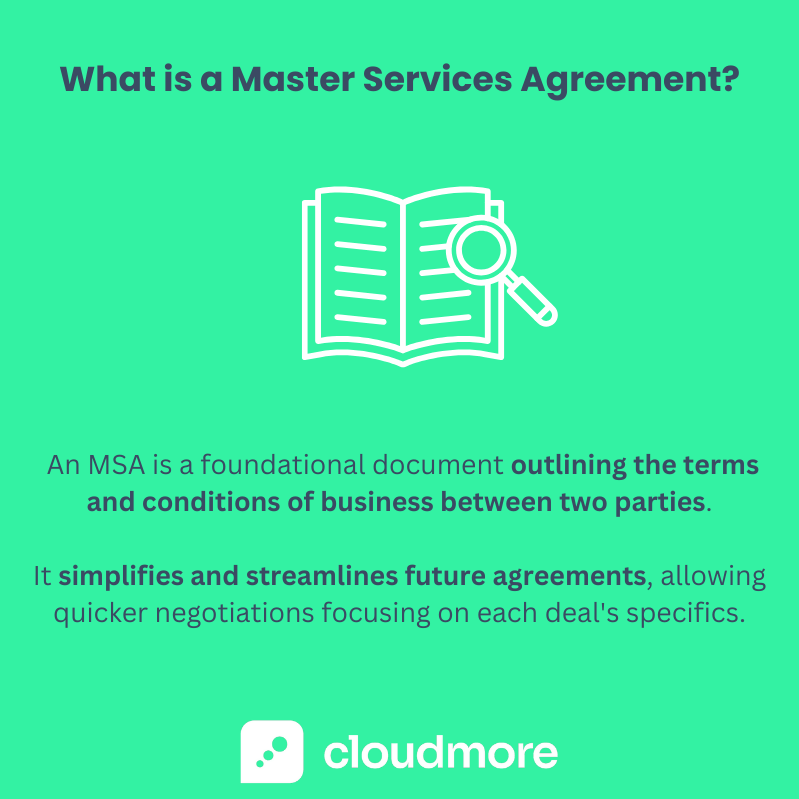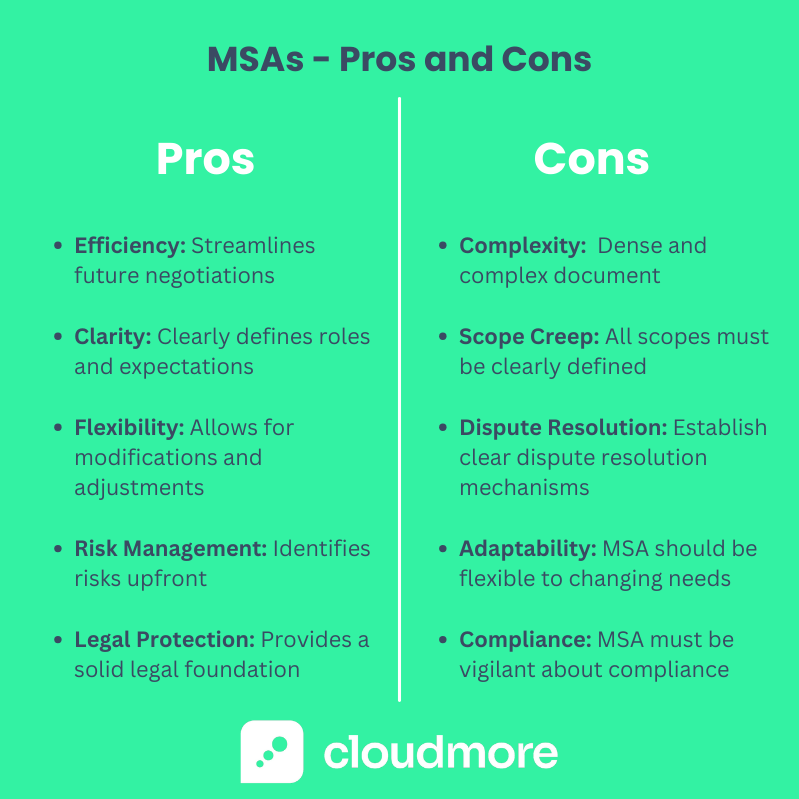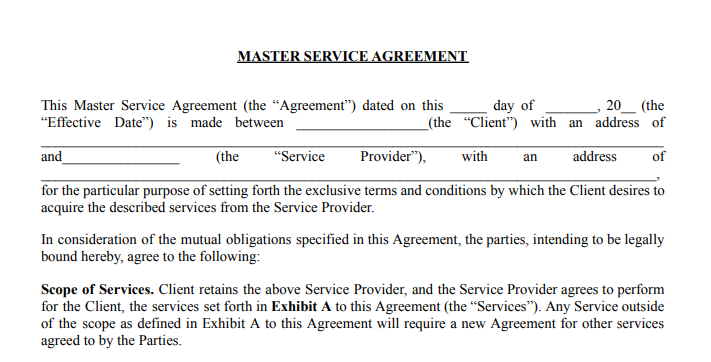Master Services Agreement (MSA) Definition, Legal Terms & More
Navigating the complexities of business contracts just got easier with our deep dive into Master Services Agreements (MSA).
An MSA isn't just another piece of paperwork; it's the backbone of fruitful business relations, outlining how companies collaborate and conduct transactions.
This article strips away the complexity, offering a comprehensive guide to understanding MSA definitions, legal terms, and their practical applications across various industries.
From essential components and critical benefits to industry-specific insights and drafting tips — this guide empowers you with the knowledge to craft agreements that pave the way for successful partnerships.
Defining an MSA
An MSA is a foundational document outlining the terms and conditions for business between two parties.

It simplifies and streamlines future agreements, allowing quicker negotiations focusing on each deal's specifics.
What is an MSA?
In the realms of IT and broader business landscapes, an MSA is a crucial tool.
It defines the framework within which services will be delivered, along with the payment terms, dispute resolution mechanisms, intellectual property rights, and confidentiality obligations.
For businesses engaging in repeated transactions, particularly in the tech industry, where the dynamics of service delivery can rapidly evolve, an MSA provides a stable base from which contracts can quickly adapt.
This adaptability is essential for maintaining a competitive edge and operational efficiency.
MSA vs. Standard Contracts
In contrast to standard contracts, an MSA stands out for its comprehensive and anticipatory approach.
While a typical service agreement might detail the specifics of a single project, including deliverables, timelines, and payment for that specific engagement, an MSA covers the legal and procedural ground for all projects under its umbrella.
For instance, while a standard contract requires renegotiating terms such as confidentiality and dispute resolution with each new agreement, an MSA sets these terms once, applying them to all future projects.
This not only saves time but also reduces the potential for disputes, as the foundational aspects of the relationship are clearly defined and agreed upon from the outset.
It's a win-win for both parties, fostering a long-term partnership rather than a series of one-off transactions.
Key Components of an MSA
MSAs are foundational to forging strong, mutually beneficial business relationships.
Understanding the core components of an MSA ensures both parties are on the same page, minimizing risks and clarifying expectations.
Essential Elements in an MSA
An effective MSA is more than just a document; it's a roadmap for business engagement.
It typically includes standard clauses that outline:
- The scope of work
- Payment terms
- Confidentiality agreements
- Liability limitations
Understanding Legal Terms in MSAs
MSAs are laden with legal jargon that can be daunting.
Terms like "indemnification," "force majeure," and "governing law" are commonplace. But what do they mean?
- Indemnification protects the parties against losses from third-party claims related to the contract's execution
- Force majeure clauses free both sides from liability or obligation when an extraordinary event or circumstance beyond their control occurs
- Governing law specifies the state's laws that will interpret the agreement, providing a clear path for resolving disputes
By demystifying these terms, companies can navigate MSAs more effectively, ensuring their interests are protected while fostering strong, lasting business relationships.
Benefits and Challenges of MSAs
MSAs streamline the complexities of business engagements, offering a framework that benefits both service providers and clients.

While MSAs bring significant advantages, they also present challenges that require careful navigation.
Advantages of Using an MSA
- Efficiency: Streamlines the negotiation process for future agreements, saving time and resources.
- Clarity in Relationships: Clearly defines the roles, responsibilities, and expectations, reducing the risk of misunderstandings.
- Flexibility: Allows for modifications and adjustments as the business relationship evolves without needing to renegotiate the agreement.
- Risk Management: Identifies and allocates risks upfront, protecting both parties.
- Legal Protection: Provides a solid legal foundation that can help prevent disputes and provide a basis for resolution if they occur.
Challenges of Using an MSA
MSAs, while beneficial, come with their set of challenges. Recognizing and addressing these can prevent issues down the line.
- Complexity: MSAs can be dense and complex. Simplifying language and seeking legal advice can ensure clarity for all parties.
- Scope Creep: Clearly define the scope of work to prevent tasks from expanding beyond the original agreement without proper compensation.
- Dispute Resolution: Establish precise dispute resolution mechanisms within the MSA to handle disagreements efficiently.
- Adaptability: Ensure the MSA allows flexibility to adapt to changing business needs or market conditions.
- Compliance: Be vigilant about regulatory compliance, especially in industries like healthcare or IT, to avoid legal pitfalls.
By leveraging the benefits and effectively managing the challenges, MSAs can be a powerful tool in establishing and maintaining successful business relationships.
Creating an Effective MSA
Crafting an MSA is pivotal in ensuring a smooth and efficient business partnership.
A well-structured MSA protects both parties and lays the groundwork for a successful collaboration.
Drafting Your MSA
When drafting your MSA, clarity and comprehensiveness are key. Here are some tips to guide you:
- Start with a clear outline: Outline the major sections and clauses your MSA will cover. This can include the scope of services, payment terms, confidentiality, and termination clauses.
- Use plain language: Avoid legal jargon where possible. The goal is to make the MSA understandable for all parties involved, not just lawyers.
- Be specific about the scope: Clearly define what services will be provided to prevent scope creep and ensure expectations are managed.
- Include a change management process: Business needs change, and your MSA should accommodate this with a transparent process for making amendments.
- Consider digital tools: Tools like DocuSign can streamline signing and managing your MSA, offering convenience and legal validity to digital agreements.
Sample MSA Analysis
Let's break down a hypothetical MSA section by section without offering legal advice:

- Introduction: Sets the stage for the agreement, identifying the parties involved and the effective date.
- Scope of Services: Describes in detail the services to be provided, including any deliverables or milestones.
- Payment Terms: Outlines how and when payments will be made, including any retainer fees or payment schedules.
- Confidentiality: Details how confidential information will be handled, ensuring both parties maintain privacy.
- Termination: Explains how either party can terminate the agreement and the conditions that would lead to termination.
Each section should be crafted with the specific needs and goals of the partnership in mind, ensuring that the MSA serves as a robust framework for the business relationship. Remember, a well-crafted MSA is not just a legal requirement; it's a blueprint for success.
MSA in Specific Contexts
MSAs are versatile tools that adapt to various business landscapes, each with unique requirements and challenges.
Recognizing the nuances of MSAs in different sectors is crucial for crafting effective and compliant agreements.
MSAs in Different Industries
MSAs must be tailored to address each industry's needs and regulatory requirements. Here's how they differ:
- IT and Technology: In the fast-paced world of technology, MSAs often include clauses on software licensing, data security, and intellectual property rights, reflecting the industry's focus on innovation and data protection.
- Construction and Engineering: These agreements may focus on project timelines, performance specifications, and liability issues, reflecting the project-based nature of the work and the importance of timelines and safety standards.
- Consulting Services: Consulting MSAs highlight the scope of work, deliverables, and confidentiality, emphasizing the intellectual property generated and its use.
- Manufacturing: In manufacturing, MSAs might detail quality control standards, supply chain requirements, and compliance with industry regulations, showcasing the need for precision and reliability.
PSA vs MSA: Understanding the Differences
While MSAs are comprehensive agreements covering the broad terms of service between companies, Professional Services Agreements (PSAs) are often more narrowly focused.
Key differences include:
- Scope: PSAs typically define the terms for a specific project or task, while MSAs cover the general terms of the business relationship across multiple projects.
- Detail: MSAs are broader in scope, whereas PSAs provide detailed descriptions of the services, including project timelines, deliverables, and specific tasks.
- Flexibility: MSAs offer a framework that can apply to various projects without renegotiation, providing flexibility and efficiency. PSAs, being project-specific, may require frequent updates or new agreements for different projects.
Understanding these distinctions is crucial for businesses to choose the proper agreement for their needs, ensuring clarity, efficiency, and protection for all parties involved.
Key Takeaways about MSAs
MSAs are more than just legal documents; they are foundational tools that facilitate smoother, more effective business collaborations.
Understanding their structure, benefits, and application across various industries is crucial for any business looking to scale and thrive.
Here are the key takeaways:
- MSAs streamline business relationships by setting clear expectations and terms upfront, reducing the need for negotiation and accelerating project kickoff times.
- Flexibility and efficiency are hallmarks of a well-drafted MSA, allowing for adjustments as business needs evolve without renegotiating the agreement.
- Comprehensive MSAs that outline responsibilities, confidentiality, and dispute resolution mechanisms enhance risk management and legal protection.
- Industry-specific considerations are crucial, as MSAs must meet each sector's unique challenges and regulatory requirements.
- Professional advice is invaluable, as MSAs' complexities and legal implications can be significant. Consulting with legal professionals ensures that your agreements comply and fully align with your business objectives.
While this guide provides an overview of MSAs and their key components, remember that each business relationship is unique.
Seeking professional legal advice to tailor your MSA to your specific needs and circumstances is highly recommended.
This ensures that your agreements are effective and provide the solid legal foundation for successful and mutually beneficial business partnerships.
Share this
You May Also Like
These Related Stories

The MSP Renaissance: Adapting to the SaaS and Subscription Revolution in IT Services

8 Challenges MSPs Face in the SaaS-Driven Market and How to Overcome Them


